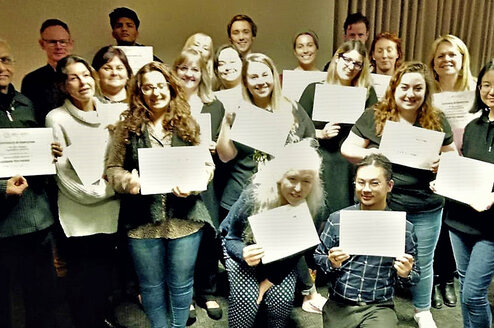Teach in New Zealand
Teaching Programs in New Zealand
About
Legend has it that Polynesian demigod, Maui, fished New Zealand out of the sea. Though New Zealand’s students also learn about the infamous Captain Cook and the unique European settlement of their country, native Maori culture, such as this, creates a classroom environment unlike any other. This small country is extremely proud, and its curriculum emphasizes Kiwi contributions to art, athletics and science.
Rankings are another source of national satisfaction, as New Zealand repeatedly tops the lists of the world’s best educational systems. Teachers are well respected and decently paid, and though its small population – roughly 4 million – means higher competition for fewer positions, it’s a challenge worth taking.
Job Types
Most teachers seeking jobs in New Zealand will come from countries with similar cultures and languages, such as the United States, Ireland, England, Australia or Canada. Regardless of your nationality, all teachers are expected to demonstrate interest in the country’s Maori and Pasifika (South Pacific) heritage. Also note that recruitment is highly dependent on your level of experience, degree or certification, and previous teaching experience.
Private Language Institutions/Schools:
ESL teachers can find employment through a program, or individually, at a private language school. These schools offer English courses for students of all levels and ages. For example, the Colorado International Teacher’s Exchange League sponsors a teaching exchange program with New Zealand; applicants must be employed full-time and have at least 5 years of experience. Jobs with other private language institutes may be advertised and arranged online, prior to your arrival in the country.
Public Schools:
For public schools, hiring typically begins in January, prior to the start of the school year. Non-native English speakers will need to score a 7 or higher on their International English Language Testing System (IELTS) in order to apply for teaching jobs. While most positions are arranged on a contract-basis, some teachers may be able to work as substitute teachers, as determined by the school system.
Government-sponsored Programs:
The Fulbright Teacher Exchange Program, sponsored by the US Department of State, provides exchange opportunities for K-12 teachers in New Zealand. Eligible applicants must have a bachelor’s degree and commit to an intensive 3-4 months course abroad.
Finding a Job
When and Where to Look for Jobs:
Some opportunities may be advertised online; however, the best way to seek a job is in-country, by visiting schools and institutions in person. Kiwis place great faith in candid conversations and first impressions, so networking plays a large role in the hiring process. Don’t let this unnerve you - New Zealand is recognized as a country that is very accepting of foreigners. In NZ, a CV (curriculum vitae) is used instead of a resume; this should contain both relevant employment information, as well as more details about your academic career and certifications. Additionally, you will need to choose a location for work, consider the following cities:
- Auckland: Auckland contains over 1/4 of the country’s entire population. As the main resettlement base for immigrants and refugees, teachers will find abundant opportunities for working in diverse ethnic and socioeconomic environments, including ESL (English as a Second Language) classes and language schools.
- Wellington: Arguably more cosmopolitan than Auckland, “Welly” is the big city that feels like a small town. Teachers can work in both public and private institutions, enjoying the educational resources – national museums, theaters, expos and events – at their fingertips.
- Christchurch: Since the 2011 earthquakes devastated much of this South Island city, Christchurch has struggled to rebuild itself. Many residents have moved away, creating a high demand for skilled educators.
- Queenstown: Labeled the ‘Adventure Capital’ of the country, this little but bustling mountain town has two English-language schools that hire ESL teachers. “QT” is an ideal destination for teachers on a working holiday visa, who are looking for travel experiences AND time in front of the classroom.
Qualifications:
Most teaching jobs in New Zealand require some form of tertiary degree, with a bachelor’s being the minimum accreditation accepted. If you’re from a country where English is not the primary language, you may need to take a language proficiency test. Finally, all foreign teachers must obtain police clearance from the country in which they last lived (for 12 months or more); this can often be done online.
Note: upon arrival in New Zealand, you must register with the New Zealand Teacher’s Council and have your qualifications assessed by the NZ Qualifications Authority.
Need to Know
Salary & Cost of Living:
Teachers can expect to earn $3,300+ USD per month in your first year of teaching work in New Zealand. This salary may change, depending on your qualifications and previous employment. In addition, the typical hourly rate for private lessons begins at $20 USD per student.
Though New Zealand is not as expensive as its neighbor, Australia, the country still experiences a relatively high standard of living. A percentage of all wages are taken out in taxes; but teachers working on a temporary or short-term visa are able to claim back their taxes once their visa expires, and they leave the country.
Housing is not usually provided to teachers, though some language schools and institutions may place teachers with host families over a short-term period of time. Since so many travelers and temporary workers move through New Zealand, it is easy to find a share-house or split rent with others.
As for food, cafes and restaurants offer cheap meal deals, as buying produce will cost significantly more. Retail and consumer items will also be costly, with a 15% goods and services tax: $16 for a movie ticket, $60 for a pair of jeans, $35 for a paperback book.
Classroom & Work Culture:
Kiwis are renowned for their relaxed, can-do attitude. The local phrase, “handy with a number 8 wire” refers to their hands-on ability to face challenges creatively and successfully. This spirit is expected in educational settings, where teachers relate closely to students and focus more on individual improvement than standardized test scores.
At the secondary and tertiary levels, it is not uncommon for students to address a teacher by first name, or treat them in a slightly more informal manner. However, respect is still given at all times. Lastly, the institution or school determines uniform and dress code standards. Female and male teachers are expected to look professional, but are not limited to specific pieces of clothing based on gender.







